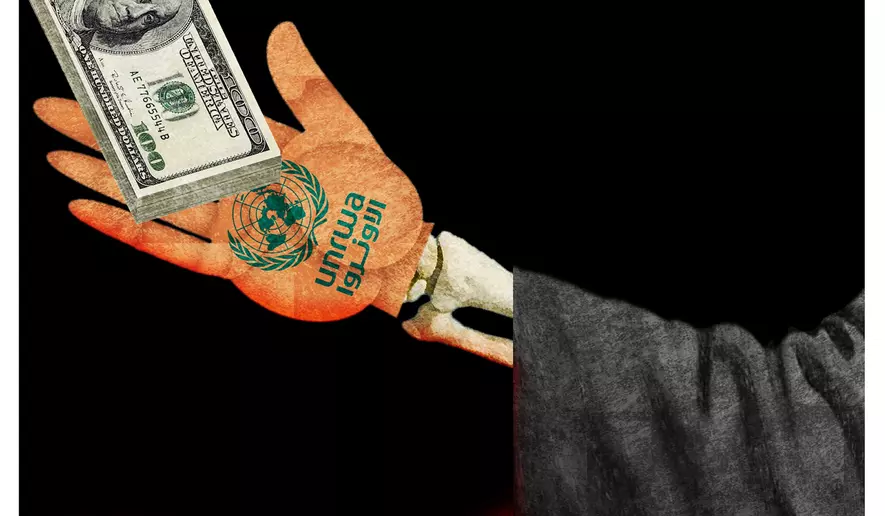Since freezing UNRWA funding in January, after evidence emerged that the agency’s employees participated in the murder and kidnapping of Israeli civilians in the Oct. 7 massacre, the United States said it will instead send money to other U.N. bodies and nongovernmental organizations in Gaza.
This is premature, ignoring the fact that the serious problems with terror support, incitement and antisemitism at the U.N. Relief and Works Agency for Palestine Refugees are replicated throughout the entire ecosystem of U.N. agencies and NGOs active in the Gaza Strip and the West Bank. While freezing funding was a laudable first step, stronger, broader, long-term action is needed before continuing to fund any organizations in Gaza or restoring funding to UNRWA.
At the heart of the problem is that, in addition to providing health care, education and other humanitarian assistance for Palestinians, UNRWA engages in advocacy in response to what it calls “the needs of Palestinian refugees affected by the Israeli occupation.”
This political advocacy work, which is often based on the delegitimization of Israel and questioning the Jewish state’s right to exist, is carried out in partnership with NGOs and other U.N. agencies.
A primary anti-Israel channel is via “clusters” of NGOs and U.N. agencies that work together on various issues. Inevitably, each cluster has an advocacy component.
For example, UNRWA partnered with Palestinian NGOs, including Al-Haq and the Palestinian Center for Human Rights, or PCHR, to carry out a project of “advocacy, monitoring and documentation of HR and IHL violations” in Gaza and the West Bank. In other words, UNRWA and the NGOs level accusations of “war crimes” and “violations of human rights” and seek condemnations of Israel from international bodies and governments.
The involvement of these particular NGOs is deeply problematic in two ways. First, they are the leaders of anti-Israel legal warfare, or “lawfare,” seeking to exploit international courts with baseless allegations of Israeli wrongdoing. The biased reports and claims from UNRWA and its NGO partners are often cited among the “evidence” in U.N. investigations of Israel, lawfare cases around the world, and empty accusations of “genocide” and “war crimes.”
The proceedings against Israel at The Hague — in the International Court of Justice and International Criminal Court — originate with this type of lobbying.
In fact, the South African submission to the ICJ accusing Israel of genocide — a charge that the U.S. has called “meritless” — contains no less than 45 references to NGO publications and 13 footnotes citing UNRWA. Unsurprisingly, representatives from Al-Haq and PCHR were members of the South African delegation to public hearings in mid-January.
Furthermore, the fact that UNRWA and its partners engage in such advocacy runs contrary to any commitment to politically neutral and independent humanitarian activity.
Second, both NGOs have links to the Popular Front for the Liberation of Palestine terror organization, known as the PFLP. Both signed a joint statement on Oct. 8, describing the Hamas massacre as “Palestinian armed groups engaged in an operation in response to escalating Israeli crimes against the Palestinian people.”
UNRWA, like the rest of the U.N. system, does not consider Hamas, Islamic Jihad or the PFLP terrorist groups. As such, it does not hesitate to partner with or employ NGOs and people affiliated with those groups. This raises difficult questions for UNRWA’s donors, since nearly all the governments that fund UNRWA, including the United States and most European countries, prohibit financial and other support for Palestinian terrorists.
The relationships with terror-linked NGOs build on UNRWA’s clear and deep connections to terrorism in Gaza, starting long before Oct. 7. The PFLP actually has an official unionized body of UNRWA employees, the Democratic Assembly. A released Israeli hostage testified that he was held in Gaza by a UNRWA teacher for nearly 50 days. And there is a Telegram group of 3,000 UNRWA teachers that celebrated Hamas’ Oct. 7 attack.
The links between terror groups and UNRWA are so widespread that Hamas used UNRWA locations, including schools, to hide weapons, locate attack tunnels and launch rocket attacks at Israel.
At the very least, donors to UNRWA need to demand that it undertake a deep-dive reform — one that will fundamentally and radically transform the organization from one that tolerates incitement and cooperates with terror groups to one that focuses strictly on the real humanitarian needs of Palestinians. Such reform should also include improved oversight and transparency so that the funders understand where their money is going and the meaningful consequences if antisemitism and terror reappear.
In addition, governments should refuse to support U.N .projects, including UNRWA, as long as Hamas, Islamic Jihad, the PFLP and other proscribed groups continue to be treated as benign actors.
The decision by donor governments to freeze funds to UNRWA pending further investigation is important. And the desire to rechannel support via other organizations during the funding freeze is understandable. But donor governments need to rethink the entire international system of aid to the Palestinians. That is a prerequisite for any progress in the region.









